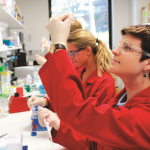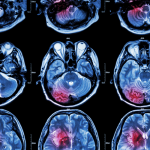Why do some people with relapsing remitting MS eventually transition to the secondary progressive phase but others do not?
This answer remains unclear, but researchers globally are trying to get a better understanding of this and also work out who is likely to develop progressive MS and why. This understanding will help with managing MS and help in the development of better treatments that can prevent progressive disease from developing.
Associate Professor Justin Rubio from the Florey Institute of Neuroscience and Mental Health in Melbourne has been awarded an MS Research Australia incubator grant to investigate whether any genes can be identified that may predict the development of progressive MS.
To date a number of genetic studies have revealed that there are over 110 genes involved in the risk of developing relapsing remitting MS, whereas there have been no genes identified conferring an increased risk of developing progressive MS. Associate Professor Rubio believes this is because the genetic changes associated with secondary progressive MS may specifically occur in the brain and spinal cord tissues, and not in the rest of the body. These types of genetic changes are known as somatic mutations and can be missed in research that searches for genetic changes in people’s blood samples.
To do this Associate Professor Rubio turned to the MS Research Australia Brain Bank. This is incredibly important for our Australian researchers as it collects, stores and classifies post-mortem brain and spinal cord tissues donated by people with MS. This valuable tissue is preserved for researchers to use in studies such as this one.
Using a technique called whole genome sequencing, Associate Professor Rubio and his team will look for somatic genetic changes that might be associated with progressive MS in individual cells in the brain and spinal cord. They will compare the genetic information between different cells from the same donor, and between people with and without MS.
This incubator grant will enable Associate Professor Rubio and his team to validate their methods and generate preliminary data that can be used for further investigation and will assist to leverage additional funds from other highly prestigious sources to complete the research.
Knowing what genes might be altered in the brain and spinal cords of people with progressive MS, and understanding the functions of those genes, may allow researchers to identify new ways to prevent and protect nerve cells from the damage caused by MS.
This research would not be possible without the vital tissue supplied by the MS Research Australia Brain Bank. We would like to thank all the people that have, or are considering, donating tissue. With your help we can work together to reduce and prevent the impact of MS on the lives of many people in the future.
To register visit www.msbrainbank.org.au






